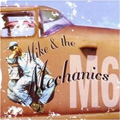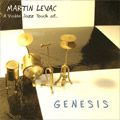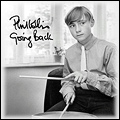


This development had clearly already begun on the Beggar album. So now there are only three mechanics left. If you consider the distribution of instruments on the three you realize that you do not really need more people for a studio production. As usual, Mike played the guitar and the bass while Paul Young sang and also played some percussion. Surprisingly, it is Paul Carrack who did most of the work. He sings and plays the keyboards, of course, but on this album he also plays (acoustic) guitar and drums. Studio drummer Gary Wallis, who could also be heard on the previous album, supports him. Six of the thirteen songs were written by Mike and Paul Carrack, two by all three of them, and only five songs were penned by the usual songwriting team of Rutherford / B.A. Robertson or Rutherford / C.Neil. The album seems livelier and fresher than the previous album that consisted of many an artificial pop element.
 One reviewer described the songs as “slim and airy”, and they are right. This is a flawless pop album that covers the topics of “boy loses girls, meets girl, loses girl” in all its variations, but not just like that, but with a certain sophistication. Brief confusion about the album title: M6? Or Mike & The Mechanics? The latter is probably correct. After all, it differs from the spelling of their debut album Mike + The Mechanics. M6 points out that this is the band’s sixth album, though it is actually their fifth studio album – and who counts Greatest hits records?
One reviewer described the songs as “slim and airy”, and they are right. This is a flawless pop album that covers the topics of “boy loses girls, meets girl, loses girl” in all its variations, but not just like that, but with a certain sophistication. Brief confusion about the album title: M6? Or Mike & The Mechanics? The latter is probably correct. After all, it differs from the spelling of their debut album Mike + The Mechanics. M6 points out that this is the band’s sixth album, though it is actually their fifth studio album – and who counts Greatest hits records?
There is not much to say about the lyrics because with an album like this the music ought to be the focus. The record is full of perfectly arranged tunes, but it is almost completely devoid of unusual sound experiments. Well, one does not have to have that all the time, and it helps the overall production. Mike perhaps needs an occasional break from it, too. Now, about the songs:
Whenever I Stop (Rutherford/Carrack) is an opening song that gives you an appetite for the rest. A fine dosage of acoustic guitars and a typically good sounding Paul Carrack surprise you with a refreshing song that even has a female backing choir towards the end. In the song someone realizes they have to change to win back another person they only appreciated once they were gone. Questions and memories vex them whenever they stop.
Now That You've Gone (Rutherford/Carrack) is the obvious hit single on the album. It has an unusually trendy dance sound (unusual for the Mechanics, that is) that makes the drums sound a bit artificial. Co-producer Brian Brawling may be responsible for this – he had launched Cher’s Believe into the charts shortly before. There are fortunately no computer-distorted vocals in the Mechanics, and the song seems a bit more solid. Paul Carrack’s vocals put the finishing touches on the song that was also released as a single. Topic: Someone is left by a loved one, has to cope with it and is only a shadow of their former self (perhaps Mike’s plaintive cry to his former Genesis band mate Phil Collins?).
Bei Ordinary Girl (Rutherford/Carrack/Young) is, surprisingly, about an ordinary girl who loves her ordinary boyfriend so much that even a man who courts her and wants to give her extraordinary things cannot get her. It is the first song with Paul Young as the lead singer; his slightly rough voice adds a special quality to this number. A great combination with Rutherford playing his guitar almost country-style.
All The Light I Need (Rutherford/BA. Robertson) is, in my opinion, the greatest ballad the Mechanics have put out so far. Only the essential instruments are playing, and the intense melody enchants the listener. The drums also carefully back off during the crucial moments. When I wrote “enchant” I do not mean to say it is corny, in the contrary, there is something magic, like the magic in the relationship the song is about. Paul Carrack lends his voice to the protagonist who, along with their counterpart, is content with the magic of the essential things that keep these people together even when times get very rough. The keyboard bit is a tiny bit off here, but the song has such a big potential that it copes well with it.
What Will You Do (Rutberford/B.A.Robertson) – Paul Carrack shouts this gloating, accusing question at his opposite number: what will you do with the rest of your life once I have left you? He makes it clear whose fault it is that the relationship failed, and the end of the song makes it clear that he is asking himself the same question. A choir supports the vocals in some places, otherwise the music offers fast unobtrusive drumming and a slightly distorted guitar sound. Those parts of the song that look back at the happy sides of the relationship are played a bit slower.
My Little Island (Rutherford/BA Robertson) is the next ballad. Paul Young sings with emotion and devotion about the (imaginary) place you can go to so you can relax. Drums and guitars sound equally devout. It is that little ideal world you can enjoy on your own or à deux, complete with gentle violins that are or are not synth strings.
Open Up (Rutherford/Carrack) begins with quiet synth drums and rough guitar sound before Carrack’s voice turns it into a melodious pop song. Show your feelings when you are in a relationship; Paul Carrack seems to also plead for a second chance. Perhaps a separation has not yet happened, but by clamming up, not revealing one’s thoughts one is constantly misunderstood and seems not trustworthy when one mentions their own feelings.
When I Get Over You (Rutherford/C. Neil) – then he will do it all in a different way: Forget about the past, repress the formed loved one though he knows it hurts them. If he is to be trusted he has also been treated badly. The Mechanics wrap this ongoing war of the roses in an easy guitar sound with mournful strings in the background and Paul Young’s vocals with lots of echo.
If Only (Rutherford/Carrack) - Paul C. makes If Only soar in the chorus while the verses of this ballad are accompanied by slow bass, quiet keyboards and a slight drum crescendo. One cannot really make out whether Paul Carrack or Mike play the brief solo on the acoustic guitar – it is certainly just one instrument. The song is about a split-up both involved are not happy with; it was apparently caused by the lack of openness in the opposite number. A second chance is inavoidable.
Asking (For The Last Time) (Rutherford/Carrack) is a pleasant song. Gentle, dynamic bass, loose drums and groovy guitars in the chorus are really catchy. Add to these some typical Carrack Hammond organ sounds and a female backing choir. Someone is asking their partner whether they can change her decision to leave him. He admits to having made mistakes but seems to indicate that he could live without her. It is, however, hard to believe him because he keeps asking the same question for the very very very last time…
Always Listen To Your Heart (Rutherford/Carrack/Young) begins with several distorted electric guitars and ambles on with unspectacular drums. Paul Young assumes the role of an experienced older person who is able to own up to mistakes and learn from them and thus he lavishes good advice on the younger generation: Listen to your heart, be honest, show strength in every life, all those things that are, basically, common sense. Several layers of Paul Young’s voice accompany the chorus.
Did You See Me Coming (Rutherford/Carrack) begins with loud and intense acoustic guitars. Later electric guitars come in, too. Paul Carrack complains about his dishonest partner on whom he wasted his time. He seems to have given her another chance again and again, and he will probably do it again though he knows about her ‘quirks’. Spot the pleasant sound from the choir of mechanics.
Look Across At Deamland (Rutherford/B.A.Robertson) is a good ending to this wonderful album. Paul Young sings on this gentle, loving ballad. Quiet instruments drift along the stream of a slow rhythm conveying a feeling of purity and inner calm. Find yourself in dreamland – perhaps the land of love young people in particular have do discover and find their way in. Discover the secrets and the magic moment, if possible with someone you love so you can reach for the stars together.
All thirteen songs are arranged superbly. Sometimes they are deep, sometimes they are not, but they all cover the ever popular topic, particularly with an eye to separations. We need not go into whether any of the mechanics had such a story of woe to tell. It is likely that the songs were written about the issues people have to tackle every day. All in all this is a flawless album and a good continuation of the project Mike & The Mechanics. Though they have shrunk in number they have emotionally grown into a full band. The quality has improved again which bodes well for further releases. If you want to compare it to Genesis you will find that this album is very different from Calling All Stations and actually closer to We Can’t Dance. Let us hope Mike has save some great ideas for the new Genesis album.
by Oliver Schwarze
translated by Martin Klinkhardt
first published in it magazine #27 (autumn 1999)



Self-titled album, though some call it M6. The last album with Paul Young, who died in 2000.
Review available


Brand new album by Martin Levac. Contains eleven Genesis-classics in Jazz style.


New Album featuring Motown Classics. Release date: September 13th, 2010 (Europe), September 28th (NA)